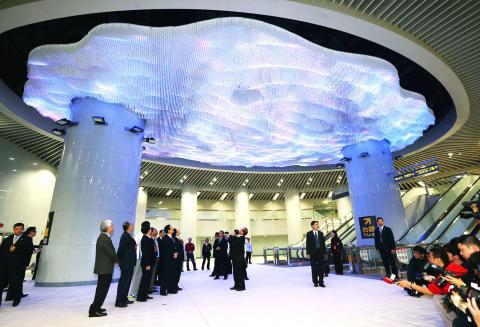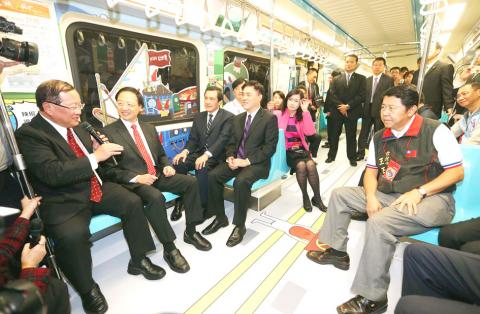The Taipei MRT’s newly completed Songshan Line is an important addition to the capital’s transportation network, as it provides more transfer options, Taipei Mayor Hau Lung-bin (郝龍斌) said at the line’s inauguration ceremony yesterday.
Under construction since 2006, the line was originally scheduled to open last year, but was held up by the discovery of a Qing Dynasty-period archeological site near the line’s Beimen Station, Taipei’s Department of Rapid Transit Systems said.
President Ma Ying-jeou (馬英九), Hau and other dignitaries yesterday toured displays of the discovered artifacts within Beimen Station, before stepping into an MRT train for a ride to the line’s Songshan terminal station.

Photo: CNA
“To maximize the ease of transferring between lines, Taipei’s MRT system was designed around three horizontal and vertical lines, with Songshan the final horizontal line,” Hau said, adding that with the opening, the city’s core MRT network is now completed.
With the exception of the airport MRT line being constructed by the Taiwan High Speed Rail Corp (台灣高鐵) to connect Taipei Main Station to Taiwan Taoyuan International Airport, all new lines called for in city plans would boast only a “medium level” passenger capacity, a step below the “high level” capacity of most of Taipei’s current lines, the department said.
Meanwhile, Hau clarified earlier remarks suggesting that Taipei independent mayoral candidate Ko Wen-je (柯文哲) winning the Nov. 29 election would lead to chaos in plans for the development of Greater Taipei’s public transportation system.

Photo: CNA
Hau, a member of the Chinese Nationalist Party (KMT), said that a non-KMT mayor might have trouble communicating effectively with the mayors of New Taipei City and Keelung, calling on all candidates to state clearly their position on planned future MRT lines linking the three cities.
The Songshan Line is an extension of the Xindian Line, running through eight stations, most of them parallel to Nanjing E Road: Ximen, Beimen, Zhongshan, Songjiang Nanjing, Nanjing Fuxing, Taipei Arena, Nanjing Sanmin and Songshan.
With the opening of the extension, trains will no longer run directly between the Xindian and Tamsui stations.
Four stations along the line connect with other MRT lines: Ximen to the Bannan Line, Zhongshan Station to the Tamsui-Xinyi Line, Songjiang Nanjing Station to the Zhonghe-Xinlu Line, the newly renamed Nanjing Fuxing Station (formerly Nanjing East Road Station) to the Wenhu Line, as well as Songshan Station to the Taiwan Railways Administration’s Songshan Station.
The Songshan Line is to start service at 6am today, allowing free travel for EasyCard holders for one month, the Taipei City government said.
Additional reporting by CNA

AIR SUPPORT: The Ministry of National Defense thanked the US for the delivery, adding that it was an indicator of the White House’s commitment to the Taiwan Relations Act Deputy Minister of National Defense Po Horng-huei (柏鴻輝) and Representative to the US Alexander Yui on Friday attended a delivery ceremony for the first of Taiwan’s long-awaited 66 F-16C/D Block 70 jets at a Lockheed Martin Corp factory in Greenville, South Carolina. “We are so proud to be the global home of the F-16 and to support Taiwan’s air defense capabilities,” US Representative William Timmons wrote on X, alongside a photograph of Taiwanese and US officials at the event. The F-16C/D Block 70 jets Taiwan ordered have the same capabilities as aircraft that had been upgraded to F-16Vs. The batch of Lockheed Martin

GRIDLOCK: The National Fire Agency’s Special Search and Rescue team is on standby to travel to the countries to help out with the rescue effort A powerful earthquake rocked Myanmar and neighboring Thailand yesterday, killing at least three people in Bangkok and burying dozens when a high-rise building under construction collapsed. Footage shared on social media from Myanmar’s second-largest city showed widespread destruction, raising fears that many were trapped under the rubble or killed. The magnitude 7.7 earthquake, with an epicenter near Mandalay in Myanmar, struck at midday and was followed by a strong magnitude 6.4 aftershock. The extent of death, injury and destruction — especially in Myanmar, which is embroiled in a civil war and where information is tightly controlled at the best of times —

China's military today said it began joint army, navy and rocket force exercises around Taiwan to "serve as a stern warning and powerful deterrent against Taiwanese independence," calling President William Lai (賴清德) a "parasite." The exercises come after Lai called Beijing a "foreign hostile force" last month. More than 10 Chinese military ships approached close to Taiwan's 24 nautical mile (44.4km) contiguous zone this morning and Taiwan sent its own warships to respond, two senior Taiwanese officials said. Taiwan has not yet detected any live fire by the Chinese military so far, one of the officials said. The drills took place after US Secretary

THUGGISH BEHAVIOR: Encouraging people to report independence supporters is another intimidation tactic that threatens cross-strait peace, the state department said China setting up an online system for reporting “Taiwanese independence” advocates is an “irresponsible and reprehensible” act, a US government spokesperson said on Friday. “China’s call for private individuals to report on alleged ‘persecution or suppression’ by supposed ‘Taiwan independence henchmen and accomplices’ is irresponsible and reprehensible,” an unnamed US Department of State spokesperson told the Central News Agency in an e-mail. The move is part of Beijing’s “intimidation campaign” against Taiwan and its supporters, and is “threatening free speech around the world, destabilizing the Indo-Pacific region, and deliberately eroding the cross-strait status quo,” the spokesperson said. The Chinese Communist Party’s “threats